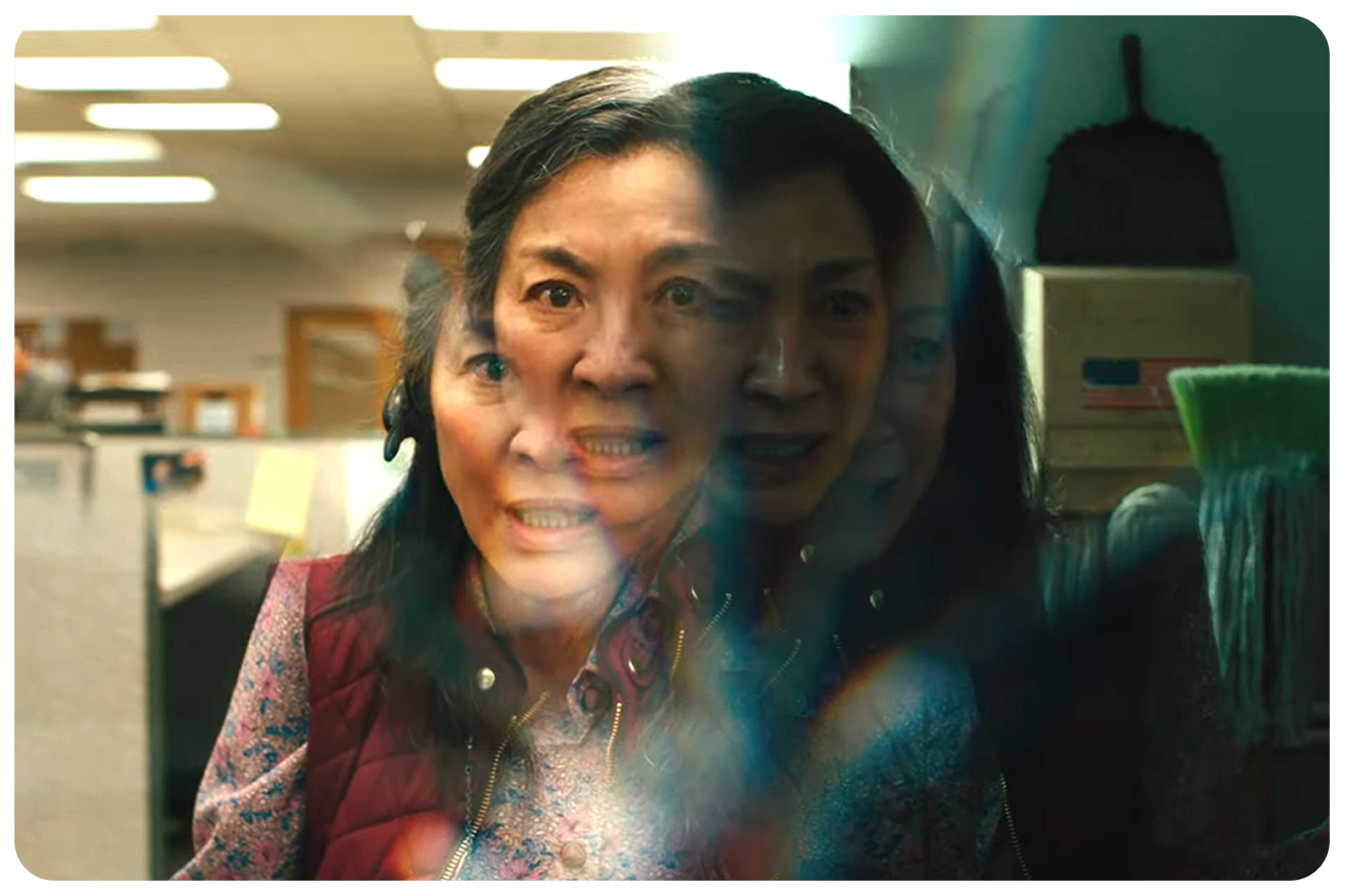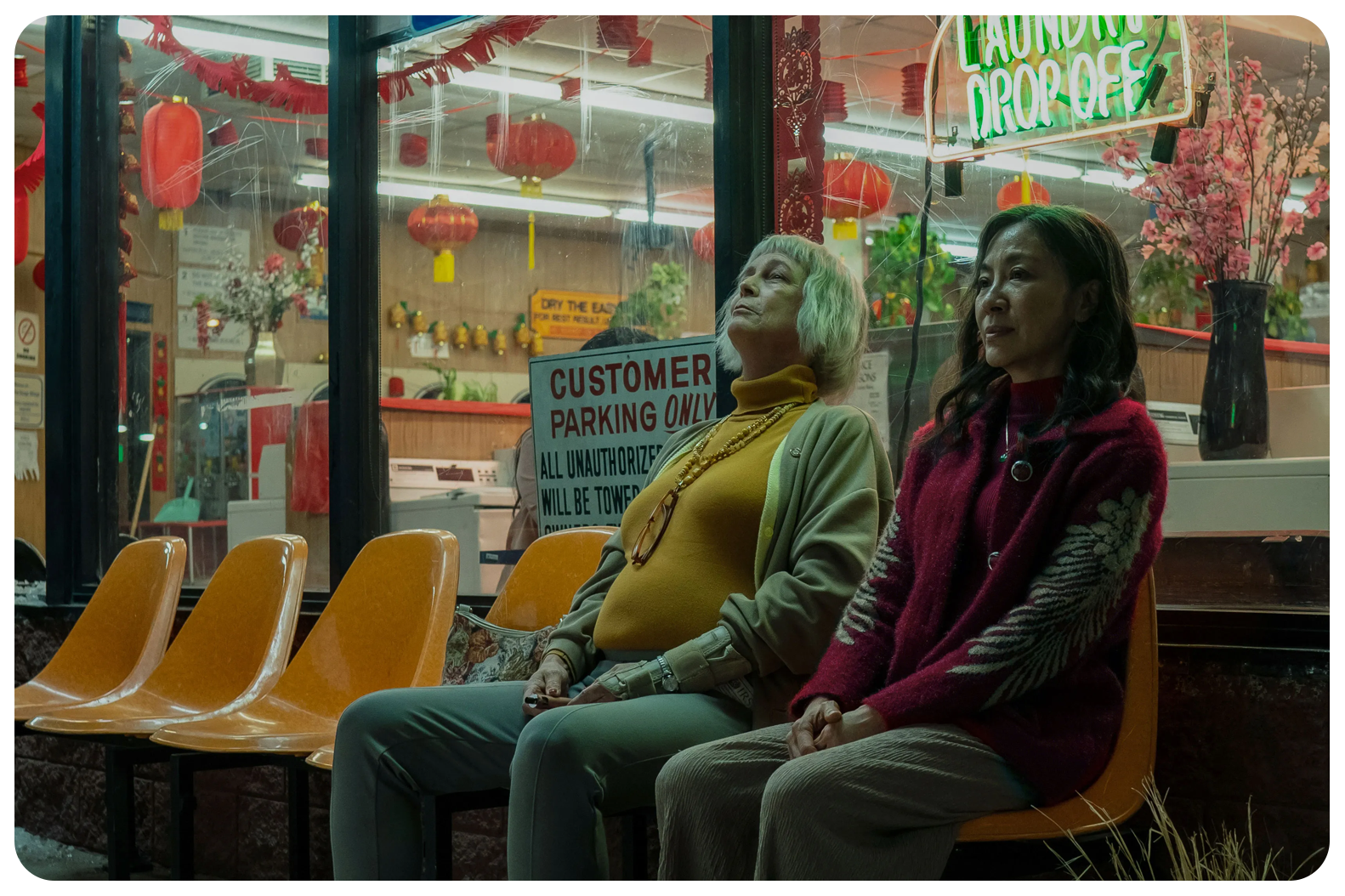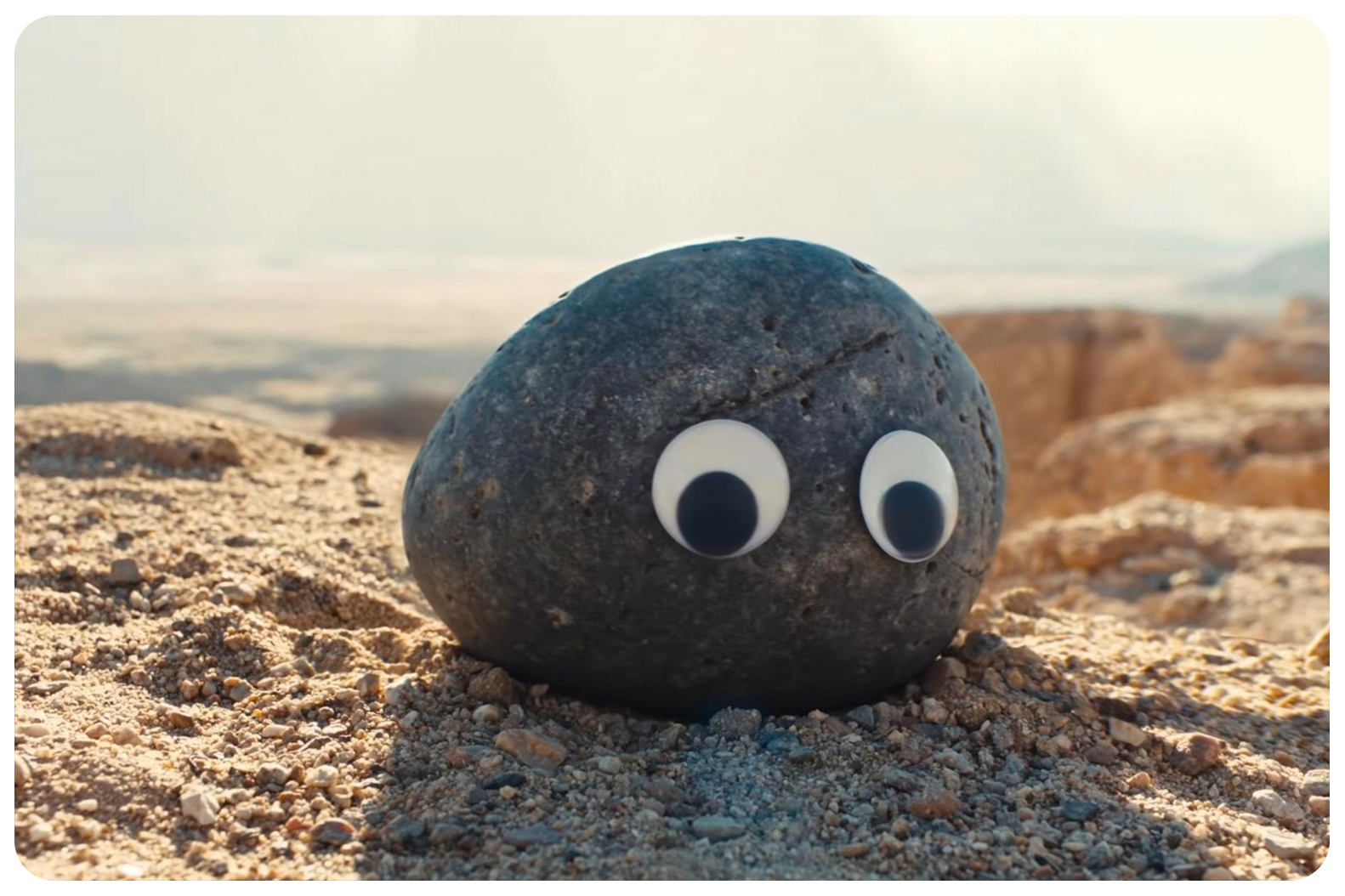Everything Everywhere All at Once (2022) swept the Oscars the other week and clinched seven accolades including the crowning achievement of “Best Picture”.
Like many others, I was blown away by the whirlwind experience watching it in theatres. As an action-comedy lover who once dreamed of making films, it thrilled me to see such daring concepts, editing and visuals put on the big screen, expertly married with philosophical reflections and a heart-stirring, character-driven story.

Directed by Daniel Kwan and Daniel Scheinert, this mind-bending, action-packed adventure film follows Evelyn (Michelle Yeoh) alongside her husband Waymond (Ke Huy Quan), as she careens through alternate universes on a quest to save the day.
Evelyn is fighting to save her world from a powerful inter-dimensional threat named Jobu Tupaki, who is a mind-splintered, alternate-universe version of her daughter, Joy (Stephanie Hsu).
It’s also worth noting that the movie is rated M18 in Singapore for language and sexual themes, so I wouldn’t recommend it to younger audiences.
I left the theatres loving so many aspects of the movie, from its acting to its visual effects to its directing.
Yet, although I had a blast watching it, something was nagging at me. I felt the worldviews that the movie portrayed were somewhat dissonant with my worldview as a Christian.
Whenever I notice that feeling in a response to a piece of art, I find it helpful to examine it through the lens of Scripture.
Nothing matters (?)
EVELYN: “What is the truth?”
JOBU: “Nothing… matters.”
After torturously experiencing all possible realities, Jobu (Joy) arrives at this nihilistic conclusion: there is no meaning to life, not in any corner of the multiverse — only pain.
The multiverse is random and chaotic, with no rhyme or reason or god. The weight and pain is so heavy on her that she forges a universe-ending device to end her life, and invites Evelyn to adopt her worldview and join her in self-destruction.

Jobu’s state here was something I could relate to: being overwhelmed by experiencing so much pain and chaos in life all at once, and finding myself wondering if there’s any meaning to any of it.
I think most of us get overwhelmed with stress in school, at work, disagreements with friends, tensions at home, anxiety about life, hopelessness, chaos.
We turn on the news and we see around the world people hurting other people, controversy, disaster and wars.
When it all bears down on us we often wonder, what’s the point of it all?
Our hope in God
In the face of such hopelessness, it is tempting to despair like Jobu. But as I looked to the Word of God, I found that we have strong reasons to cling to hope.
- It’s not true that nothing matters. We believe that the universe and life have purpose: to glorify God and for us to enjoy Him forever.
- It’s not true that the universe is random and chaotic. We believe that the universe is ordered: God sovereignly holds it together according to His will (Colossians 1:17).
- It’s not true that there’s no hope. We believe that there is a rock-solid hope: Jesus has redeemed broken humanity and will come again to renew our broken world (Revelation 21:5).
Yes, humans might be “small and stupid” as Evelyn suggests, but we have a big and wise God who emptied Himself, taking the form of “small and stupid” humanity (Philippians 2:1-11).
As a human, Jesus is able to sympathise with our weakness (Hebrews 4:15). He was obedient unto death and rose again so that, in Him, sinful humans can be made holy and find happiness in God.
If God was willing to pay that price to give us life, then our lives must be precious to Him and worth living!
The pains of this world are not random. God is in control and works all things together for good (Romans 8:28).
In the midst of even the deepest of pain we have unshakeable hope: our trials will seem light compared to the weighty future glory that awaits us (2 Corinthians 4:17).
For Jobu, there was little hope for pain to end. But for Christians, there is a coming day when all pain will cease — forever.
God will right every wrong and bring recompense. Our Heavenly Father Himself will wipe away every tear from our eyes (Revelation 21:4).

Although we have this hope, I found that the Bible still wrestles honestly with pain and even God.
In the Psalms, we hear people who felt abandoned by God in their depression, and even questioned His existence (Psalms 13, 42, 88).
Ecclesiastes also interrogated the meaning of life 2,000 years before Jobu did.
I personally find comfort in these wisdom writings, knowing I’m in good company when I struggle. Such passages help to give the words to express my heartache, even as I hold on to God.
Be kind
“The only thing I do know is that we have to be kind. Please, be kind. Especially when we don’t know what’s going on.”
Consumed by bitterness and pain, Evelyn rampages throughout the multiverse.
However, her husband Waymond intervenes and shows that though the universe is meaningless and painful, he chooses to be positive and kind.
Persuaded, Evelyn uses her powers to show kindness to her aggressors, winning Joy over and pulling her back from taking her life.
At the end, the film closes with the family restored, having learnt that while the universe may be meaningless, they have freedom to choose what is meaningful: being kind.
The reason for kindness
Yes and yes, we ought to be kind as Christians!
The simplicity of Waymond’s kindness was profound and moving, and something worth emulating.
Yet, if the universe has no meaning, I had difficulty understanding why the characters thought being kind was meaningful.

In contrast, when I looked to Scripture, I was gripped by the compelling reasons God gives for us to be kind.
First of all, humans are valuable. Humans are not cosmic accidents in a chaotic multiverse — we are created purposefully in the image of God (Genesis 1:26).
Each one of us are fearfully and wonderfully made, and intimately known by our Father (Psalm 139).
We are valuable and worthy of kindness only because God and His image in us are valuable.
Second, God commands us to love others.
Kindness isn’t meaningful because we choose to give it meaning. It’s meaningful because God gave it meaning and commands us to do so.
We are called to find every opportunity to do good to all people (Galatians 6:10) and to love even our enemies (Luke 6:27-28).
It also means pursuing kindness on God’s terms, not ours.
Sometimes that means lovingly correcting our friends, or making a stand for biblical principles that may be perceived by the world as unkind.

Lastly, Christ demonstrates His love for us by dying for us while we were His enemies (Romans 5:8).
We are able and willing to self-sacrificially love others because we follow the example of a self-sacrificial God. We love because He first loved us (1 John 4:19).
So yes, we should be kind to others, especially in times of difficulty. And as we do so, we should remember to affirm these weighty truths that fuel Christian kindness.
Everything, everywhere – to the glory of God
Everything Everywhere All at Once masterfully captured the spirit of our times.
Many of us are overwhelmed with possibility, conflict, expectations, pain – all at once. Many of us are longing for purpose and meaning in life.
And many of us desperately need kindness in our lives.

Even as we go through these things collectively, I found it helpful to view them through the lens of God’s Word, to see what God says about hopelessness, about purpose, about kindness.
My prayer is that we will continue to be that light for Christ by loving our neighbours, fuelled by God’s first love for us.
And I pray that we can rejoice, having found our meaning in life in God: for from Him and through Him and to Him are all things.
May we hold firm to our unshakeable anchor in Christ through even the most painful and bleakest of times, for He is a God who is sovereign over everything, everywhere, for all of time.
- Did you catch Everything Everywhere All at Once? What did you think?
- How did the author’s sharing resonate with you or challenge you?
- God’s glory. From today onwards, what is one thing you must change in your life to live it out?









